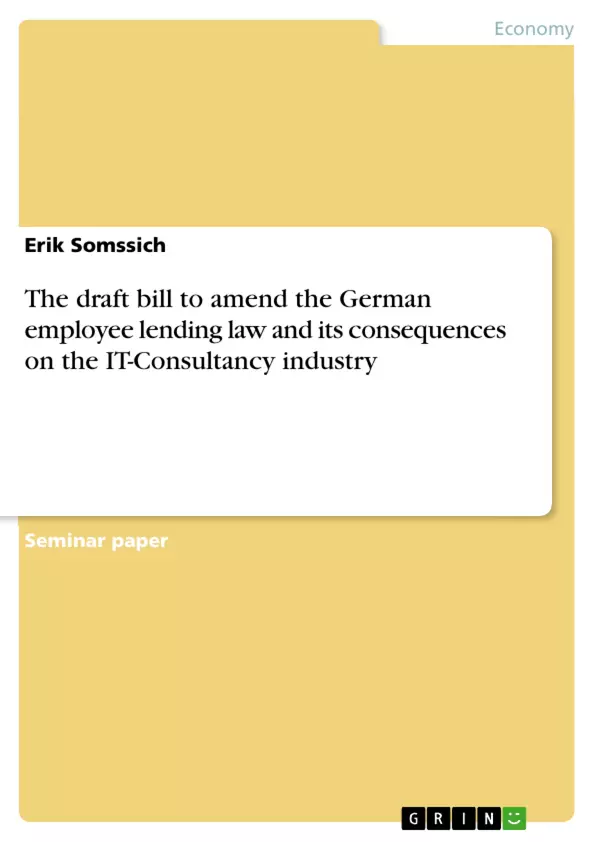In May 2016 the German government coalition agreed on a draft law to amend the law for personnel leasing. The purpose of this paper is to evaluate the consequences of the draft bill on the IT-Consultancy industry and the human resources departments of companies from all sectors.
In order to analyze the relationship between the draft law and the IT-Consultancy industry, some legal aspects concerning labor laws are explained first. After a description of the prupose of the new law, possible consequences on the IT-Consultancy industry and on human resource planning are presented.
Inhaltsverzeichnis (Table of Contents)
- Introduction
- Current situation in Germany
- Forms of contract
- Personnel leasing
- "Werkvertrag"
- "Dienstvertrag"
- Bogus self-employment
- IT-Consulting services
- Forms of contract
- The draft bill
- Purpose
- Significant changes
- Consequences on the IT-Consulting industry
- Consequences for companies human resource planning
- Conclusions
Zielsetzung und Themenschwerpunkte (Objectives and Key Themes)
This paper aims to analyze the consequences of the draft bill to amend the German employee lending law on companies hiring IT consultancy services. It examines the current situation of employment contracts in Germany, particularly the use of personnel leasing, “Werkverträge,” and “Dienstverträge.” The paper then delves into the proposed changes in the draft bill, exploring its purpose, significant modifications, and potential impact on the IT-consulting industry and company human resource planning.
- The evolving landscape of employment contracts in Germany
- The use of personnel leasing and its limitations
- The draft bill to amend the law for personnel leasing and its intended impact
- The consequences of the draft bill on the IT-consulting industry
- The impact on companies' human resource planning
Zusammenfassung der Kapitel (Chapter Summaries)
The introduction provides an overview of the increasing flexibility of employment contracts in Germany and the impact of the 2002 law for modern services on the labor market. Chapter 2 discusses the various forms of contract used in Germany, including personnel leasing, “Werkverträge,” and “Dienstverträge,” and examines the issue of bogus self-employment.
Chapter 3 focuses on the draft bill to amend the law for personnel leasing, outlining its purpose and significant changes. It also explores the bill's potential consequences for the IT-consulting industry and companies' human resource planning.
Schlüsselwörter (Keywords)
The paper focuses on key terms and concepts related to employment contracts, personnel leasing, “Werkverträge,” “Dienstverträge,” bogus self-employment, IT-consulting services, and human resource planning. It explores the impact of the draft bill on these areas, highlighting the potential implications for companies and the IT industry in Germany.
Frequently Asked Questions
What is the purpose of the 2016 draft bill to amend the German personnel leasing law?
The main purpose is to prevent the abuse of personnel leasing and "Werkverträge" (contracts for work), ensuring better protection for employees and clearer distinctions between different forms of employment.
How does the draft bill affect the IT-Consultancy industry?
The bill introduces stricter regulations that could classify many IT consulting projects as personnel leasing, potentially leading to higher administrative burdens and legal risks for consultancy firms.
What is "bogus self-employment" (Scheinselbstständigkeit)?
It occurs when a person is officially contracted as an independent freelancer but works under the same degree of instruction and integration into a company as a regular employee.
What are the consequences for human resource planning?
Companies must more carefully evaluate whether they use "Werkverträge" or "Dienstverträge" and may face legal penalties if the actual work relationship does not match the contract type.
What is the difference between "Werkvertrag" and "Dienstvertrag"?
A "Werkvertrag" focuses on a specific result or "work" to be completed, while a "Dienstvertrag" focuses on the provision of services over a period of time without guaranteeing a specific outcome.
- Citation du texte
- Erik Somssich (Auteur), 2016, The draft bill to amend the German employee lending law and its consequences on the IT-Consultancy industry, Munich, GRIN Verlag, https://www.grin.com/document/356697



